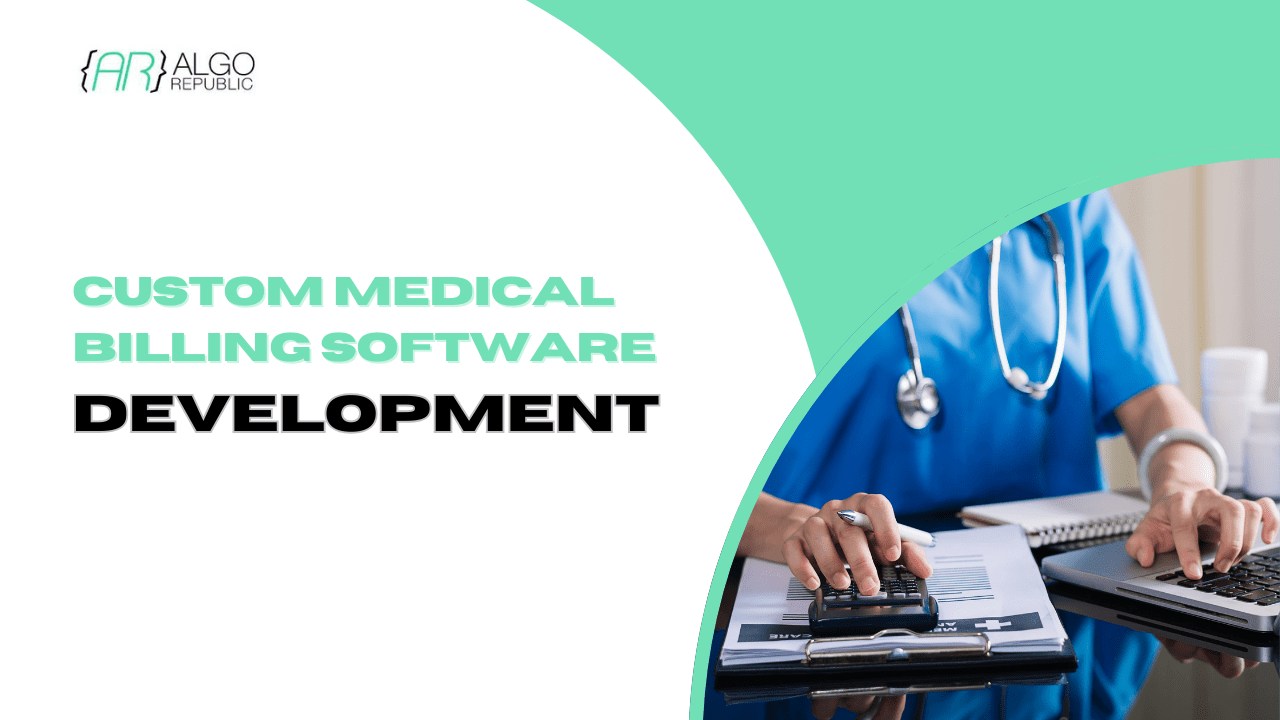Table of Contents
Creating custom medical billing software is increasingly essential in today’s healthcare landscape, where providers face numerous challenges in managing billing processes. Many healthcare organizations struggle with inefficiencies, billing errors, and complexities associated with insurance claims, leading to delayed payments and revenue loss. The global healthcare software market was valued at approximately $51 billion in 2022 and is projected to reach about $74 billion by 2030, growing at a CAGR of around 6.6%. As a result, investing in medical billing software has proven to significantly enhance revenue growth and streamline operations.
Healthcare organizations are reaping the benefits of tailored medical billing solutions that address their specific needs. By partnering with scalable healthcare app developers, providers can create innovative medical billing software that integrates seamlessly with existing systems, ensuring accurate and efficient billing processes. These custom solutions can adapt as organizations grow, enabling them to meet changing demands in a rapidly evolving healthcare environment. Here is a complete guide for you to thoroughly look into how custom medical billing software is made and why it is important for healthcare providers to acquire.
Learn About Medical Billing Software
Medical billing software is a specialized tool designed to streamline the billing process for healthcare providers. It automates various tasks, such as managing patient records, processing insurance claims, and generating invoices. By consolidating these functions into one system, medical billing software helps reduce errors, speeds up the billing cycle, and ensures that healthcare providers receive timely payments for their services. This efficiency is vital in the healthcare industry, where accurate billing directly impacts revenue and patient satisfaction.
In addition to simplifying billing operations, medical billing software often includes features like reporting and analytics, which allow healthcare providers to track financial performance and identify trends. It also ensures compliance with regulations, such as HIPAA, by protecting sensitive patient information. Overall, medical billing software enhances the efficiency of billing processes, reduces administrative burdens, and improves financial management for healthcare organizations.
How to Build Custom Medical Billing Software?
Healthcare providers are in dire need to create advanced solutions for their healthcare systems. This can be possible by hiring a proficient healthcare app development company that can create innovative solutions for medical billing software. Here are important details about how you can get custom-made medical billing software for your organization.
Requirements Gathering
The first step in developing custom medical billing software is to gather detailed requirements. This involves working closely with healthcare providers, billing specialists, and end-users to understand their specific needs. Conduct interviews, surveys, and focus groups to identify pain points in existing processes and gather insights on desired features. This stage is crucial as it sets the foundation for the entire project, ensuring that the final product aligns with user expectations.
Define Features
After gathering the requirements, the next step involves identifying and defining the key features that the software must include. Key functionalities to consider include:
- Claim Management: Streamlining the process of submitting and tracking insurance claims.
- Patient Management: Keeping comprehensive records of patients, including their demographic details and billing history.
- Invoicing: Generating invoices based on services rendered, ensuring accuracy in billing.
- Payment Processing: Enabling secure online payments and tracking outstanding balances.
- Reporting and Analytics: Providing insights into financial performance, outstanding claims, and billing efficiency. These features should be prioritized based on user needs and regulatory compliance requirements.
Choose a Technology Stack
Selecting the right technology stack is essential for building a robust medical billing software. This involves choosing programming languages (like Java, .NET, or Python), frameworks, and databases (such as MySQL or MongoDB) that best fit the project’s technical requirements. Consider elements such as the ability to scale, system performance, and how seamlessly it integrates with other platforms. Opting for modern technologies can enhance the software’s functionality and long-term viability.
Design the Architecture
Designing the system architecture is a critical phase that involves planning how different components of the software will interact. This includes deciding on front-end technologies (what users see and interact with) and back-end services (how data is processed and stored). A well-thought-out architecture ensures that the software is scalable, reliable, and can accommodate future enhancements.
User Interface (UI) and User Experience (UX) Design
A simple and easy-to-use interface is vital for medical billing software since healthcare staff will interact with it daily. Invest time in designing a clean and straightforward UI that allows users to navigate easily between different functionalities. Test the design with real users to gather feedback and make necessary improvements. A positive user experience can lead to higher adoption rates and improved productivity.
Compliance with Regulations
Healthcare software must follow strict rules to protect patient information. To ensure compliance and safeguard sensitive data, it is important to understand laws like HIPAA in the U.S. or GDPR in Europe. These regulations are in place to maintain privacy and security standards in the handling of patient information. Implementing compliance measures during development will help avoid legal issues and build trust with users.
Integration with Existing Systems
Many healthcare organizations already use various software systems, such as Electronic Health Records (EHR) or Practice Management Systems (PMS). Ensuring that your medical billing software can integrate seamlessly with these systems is vital for streamlining workflows and avoiding data silos. Plan for APIs (Application Programming Interfaces) that facilitate communication between different software systems.
Implement Security Measures
Security is a top priority in healthcare software development. Implement robust security measures, including data encryption, user authentication, and access controls, to protect sensitive patient information. Regular security audits and updates should also be part of your development process to safeguard against potential threats.
Development Methodology
Choose a suitable development methodology to manage the project effectively. Agile development, for instance, emphasizes iterative progress and continuous feedback, allowing for flexibility and adaptation as the project evolves. Alternatively, the Waterfall model is a more linear approach that might suit projects with clearly defined requirements. Select a methodology that aligns with your team’s workflow and project goals.
Testing and Quality Assurance
Thorough testing is critical to ensure the software functions correctly and meets user expectations. Conduct various testing types, including unit tests (testing individual components), integration tests (testing how components work together), and user acceptance testing (involving end-users to validate functionality). Identify and fix any issues before deployment to minimize disruptions.
Training and Documentation
Providing training and comprehensive documentation is essential for user adoption. Create user manuals, video tutorials, and hands-on training sessions to help users understand how to use the software effectively. Well-documented processes will also make it easier for new staff to get up to speed and reduce the learning curve.
Deployment
After thorough testing and training, it’s time to deploy the software. Consider a phased rollout, starting with a pilot group of users to gather feedback and address any initial issues. This gradual approach can minimize disruption and allow for adjustments based on user experiences before a full-scale launch.
Ongoing Support and Maintenance
Ongoing support after deployment is vital to ensure the software continues to function well and meets users’ expectations. Set up a reliable system for resolving issues and responding to user feedback. Regular updates and maintenance are also essential to enhance functionality, improve security, and incorporate user feedback over time.
Feedback Loop
Create a process for gathering user feedback after the software is in use. Regularly solicit input from users about their experiences and suggestions for improvement. This feedback loop is vital for ensuring the software evolves in line with user needs and industry changes.
Why Custom Medical Billing Software is Crucial for Healthcare Providers?
Custom medical billing software is vital for healthcare organizations as it provides tailored solutions to meet unique needs, enhances accuracy, and many more. By investing in the scalable solutions for healthcare app development services, healthcare providers can optimize their billing processes, improve financial performance, and focus more on delivering quality patient care. Here are the reasons by which you can learn the importance of custom medical billing software for your organization.
Tailored Solutions for Unique Needs
Every healthcare organization has its own specific workflows, billing processes, and regulatory requirements. Custom medical billing software can be designed to address these unique needs directly, allowing for more efficient operations. For instance, a specialty clinic might have different billing requirements compared to a general practice. Custom software ensures that all processes align with the organization’s specific practices, which can reduce errors and improve overall efficiency.
Improved Accuracy and Compliance
Billing errors can lead to significant financial losses and regulatory penalties. Custom medical billing software can incorporate the latest coding standards, guidelines, and compliance requirements, minimizing the risk of mistakes. It can also include automated checks that help ensure all claims are accurate before submission. By reducing errors, organizations can enhance their revenue cycle management and ensure compliance with regulations such as HIPAA, protecting sensitive patient information.
Enhanced Integration Capabilities
Healthcare organizations often use multiple software systems, including Electronic Health Records (EHR) and Practice Management Systems (PMS). Custom medical billing software can be built to integrate seamlessly with these existing systems, facilitating smooth data sharing and reducing the need for duplicate data entry. This integration leads to a more streamlined workflow, allowing staff to focus on patient care rather than administrative tasks.
Scalability for Future Growth
As healthcare organizations grow or adapt to changing needs, their billing processes may also evolve. Custom medical billing software can be designed with scalability in mind, making it easier to add new features or accommodate increased billing volumes as the organization expands. This adaptability ensures that the software remains relevant and effective over time, saving organizations from the costs and disruptions of switching to new systems.
Enhanced Reporting and Analytics
Custom medical billing software can provide tailored reporting and analytics features that align with an organization’s specific goals and metrics. This capability allows healthcare providers to gain insights into their financial performance, track key performance indicators (KPIs), and make informed decisions based on real-time data. With better visibility into billing processes, organizations can identify trends, optimize operations, and ultimately improve their financial health.
Better Patient Experience
Ensuring an efficient billing process is key to keeping patients satisfied. Custom medical billing software can enhance the patient experience by offering features such as online payment options, easy-to-understand invoices, and patient portals where individuals can access their billing information. When patients find the billing process easy and transparent, they are more likely to have a positive perception of the healthcare organization.
Cost Efficiency in the Long Run
While custom medical billing software may require a higher initial investment compared to off-the-shelf solutions, the long-term benefits can outweigh the costs. By reducing errors, improving efficiency, and streamlining operations, custom software can lead to significant cost savings over time. Also, the software’s ability to adapt and scale over time can help avoid the need for expensive upgrades or replacements later on.
Types of Medical Billing Software for Healthcare Organizations
When it comes to medical billing software, healthcare providers have various options tailored to different needs and organizational sizes. Here are the main types of medical billing software available for healthcare providers:
Standalone Medical Billing Software
This type of software focuses solely on billing functions. It handles tasks such as claims submission, payment processing, and invoicing. Standalone solutions are ideal for small practices or organizations looking for a simple billing system without the need for additional features like EHR.
Integrated Medical Billing Software
Integrated software combines billing functionality with other essential healthcare processes, such as Electronic Health Records (EHR) and Practice Management Systems (PMS). This type allows for seamless data exchange between systems, improving efficiency and reducing manual data entry. It is suitable for medium to large healthcare organizations that require comprehensive solutions.
Cloud-Based Medical Billing Software
Cloud-based solutions are hosted on the internet, allowing users to access the software from any device with an internet connection. These solutions typically offer automatic updates, data backups, and enhanced security. Cloud-based billing software is particularly advantageous for practices that prioritize flexibility and remote access.
On-Premise Medical Billing Software
On-premise solutions are installed locally on the organization’s servers. This type offers complete control over data and software customization but may require a higher initial investment for hardware and IT support. On-premise systems are often preferred by larger organizations with specific regulatory or security needs.
Practice Management Software with Billing Modules
Practice management software often includes billing as one of its core functionalities. These systems manage appointments, patient records, and billing processes in one integrated platform. They are suitable for healthcare providers seeking a comprehensive solution that streamlines multiple aspects of practice management.
Specialty-Specific Medical Billing Software
Some medical billing software is tailored to specific specialties, such as cardiology, orthopedics, or dermatology. These solutions come with features and coding options designed to meet the unique billing requirements of each specialty, enhancing accuracy and efficiency.
Essential Features to Consider When Looking for Custom Medical Billing Software
Searching for custom medical billing software can be challenging. Hence, it is important to identify essential features that will enhance efficiency, accuracy, and overall user experience. Here are some key features to consider:
Claim Management
- The software should allow for electronic submission of claims to insurance companies to expedite the reimbursement process.
- It should provide real-time tracking of claims to monitor their status and identify any issues that may arise.
Patient Management
- The software should maintain detailed patient profiles, including demographics, insurance information, and billing history.
- Integration with appointment scheduling systems can improve workflow by linking patient visits with billing.
Invoicing and Billing
- The ability to create professional, easy-to-understand invoices tailored to the organization’s branding.
- Support for multiple payment methods, including credit cards, ACH transfers, and online payments, to offer convenience to patients.
Reporting and Analytics
- The software should provide detailed reports on revenue, outstanding claims, and other key performance indicators (KPIs).
- An intuitive dashboard that allows users to visualize data trends and track financial performance over time.
Integration Capabilities
- Seamless integration with existing Electronic Health Records (EHR) and Practice Management Systems (PMS) to reduce manual data entry and enhance workflow.
- Ability to connect with other tools or systems used in the organization, such as payroll or accounting software.
Regulatory Compliance
- Features that ensure adherence to HIPAA regulations for patient privacy and data security.
- The software should automatically update to comply with the latest coding and billing regulations, including ICD-10 and CPT codes.
User-Friendly Interface
- A clean and easy-to-navigate interface that minimizes the learning curve for users.
- The ability to customize the user interface to meet the preferences of different users or departments.
Security Features
- Robust encryption methods to protect sensitive patient and financial information.
- User authentication and role-based access controls to ensure that only authorized personnel can access specific features or data.
Customer Support and Training
- Reliable customer support options, including phone, email, and chat, to assist users with any issues that may arise.
- Comprehensive training materials and resources to help staff become proficient in using the software.
Scalability
- The software should be designed to accommodate growth, allowing for the addition of new features or increased billing volumes as the organization expands.
- Option to implement additional modules or features as needed without requiring a complete system overhaul.
Ready-Made Vs. Bespoke Medical Billing Software
Ready-Made Medical Billing Software
Ready-made medical billing software is off-the-shelf solutions that can be quickly implemented. These products are designed to serve a broad range of healthcare organizations and often include essential features needed for billing operations. However, ready-made software may lack the flexibility and customization options needed for specific workflows, which can lead to inefficiencies in some cases. The advantages include:
- Cost-Effective: Generally, ready-made solutions are more affordable than custom-built software, as the development costs are spread across multiple users.
- Quick Deployment: These solutions can be implemented relatively quickly, allowing healthcare providers to start billing almost immediately.
- Proven Reliability: Ready-made software often comes with user reviews and established track records, which can provide reassurance regarding functionality and support.
Bespoke Medical Billing Software
Bespoke medical billing software is custom-built to meet the specific needs of a healthcare organization. This type of software is tailored to the unique workflows, compliance requirements, and integration needs of the practice or hospital. You can find a dedicated healthcare app development company which has a strong expertise in creating personalized medical billing software solutions for you. The primary benefits include:
Customization: Custom solutions can be tailored to meet the specific processes and needs of the organization, resulting in enhanced flexibility and efficiency.
Scalability: As the organization grows or changes, bespoke software can be adapted to accommodate new needs, making it a long-term solution.
Integration: It can be built to seamlessly integrate with existing systems, such as Electronic Health Records (EHR) and Practice Management Systems (PMS), improving overall efficiency.
Which One is Better?
The choice between bespoke and ready-made medical billing software largely depends on the specific needs and circumstances of the healthcare organization. If the organization has unique requirements, complex billing processes, or plans for growth, bespoke software may be the better option despite the higher cost and longer implementation time. However, for smaller practices or those looking for a more straightforward, cost-effective solution, ready-made software can be a practical and efficient choice. Ultimately, the decision should consider factors such as budget, timelines, specific needs, and long-term goals.
Conclusion
In conclusion, investing in custom medical billing software is crucial for healthcare providers seeking to enhance their operational efficiency, accuracy, and overall patient satisfaction. By tailoring solutions to meet specific organizational needs, providers can streamline billing processes, reduce errors, and ensure compliance with regulations.
Moreover, features like seamless integration with existing systems, robust reporting capabilities, and scalability for future growth make custom solutions a valuable asset in a rapidly evolving healthcare landscape. Ultimately, the right medical billing software empowers healthcare organizations to focus more on delivering quality patient care while optimizing their revenue cycle management.
Choose AlgoRepublic to Get Bespoke Medical Billing Software
At AlgoRepublic, we pride ourselves on being a leading software development company specializing in innovative medical solutions using EHR systems. Our deep understanding of the healthcare industry, combined with our commitment to excellence, enables us to create custom software that meets the evolving needs of medical practices. We leverage the latest technologies, including Gen-AI, to deliver robust solutions that enhance efficiency and streamline operations.
Why Choose AlgoRepublic for Custom Medical Billing Software?
- Gen-AI Solutions: We utilize cutting-edge Gen-AI technology to automate processes, reduce errors, and enhance billing accuracy.
- Tailored Development: Our custom solutions are designed specifically for your medical practice, ensuring they meet your unique operational needs.
- Expertise and Support: With a team of experienced professionals, we provide ongoing support and guidance to help you navigate the complexities of medical billing.
- Seamless Integration: Our software seamlessly integrates with your current systems, ensuring a smooth transition and minimal disruption to your practice.
- Regulatory Compliance: We prioritize compliance with industry regulations, ensuring your billing processes are secure and up-to-date.
Choose AlgoRepublic for a custom medical billing solution that optimally aligns with your practice’s needs. Contact us today to learn how we can help streamline your billing processes and improve your overall efficiency!
FAQs:
Custom medical billing software is a tailored solution designed specifically for healthcare practices to automate and streamline their billing processes. It helps manage patient invoices, insurance claims, and payment tracking, ensuring accuracy and compliance with industry regulations.
Gen-AI technology automates repetitive tasks, reduces errors, and improves billing accuracy by analyzing data patterns. This leads to faster claim processing and more efficient revenue cycles, ultimately benefiting your practice’s financial health.
Yes! Our custom medical billing software is designed for seamless integration with your existing systems, ensuring a smooth transition and minimal disruption to your practice’s operations.
At AlgoRepublic, we provide ongoing support and guidance after implementation. Our team of experienced professionals is available to assist with any issues and help you optimize your billing processes.
Absolutely! We prioritize regulatory compliance in our software development process, ensuring that your billing practices meet the latest industry standards and guidelines for security and accuracy.
Getting started is easy! Simply contact us to discuss your specific needs and schedule a consultation. We’ll work with you to create a tailored solution that aligns with your practice’s goals.



